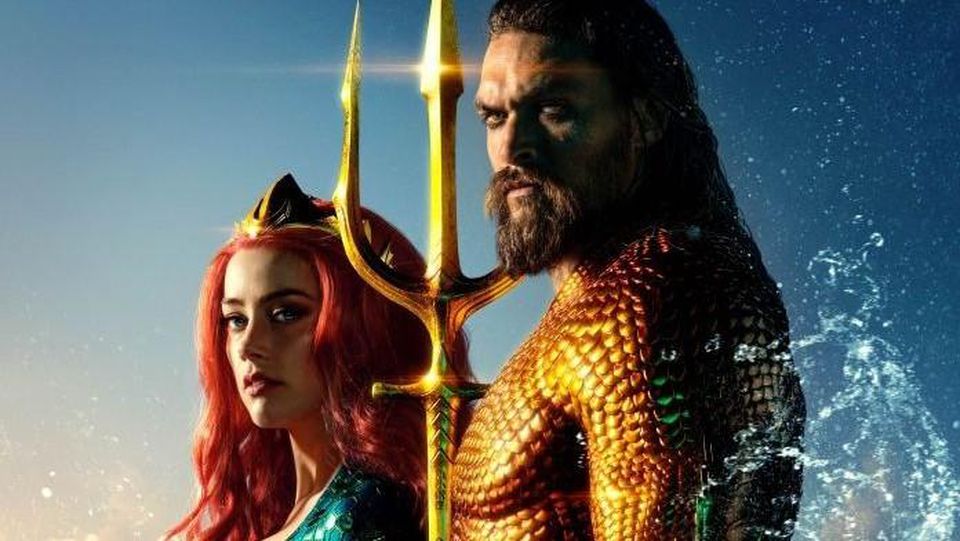2018 has been a year that’s been indisputably dominated by Marvel on the big screen. Black Panther, Avengers: Infinity War, Ant-Man and the Wasp, Deadpool 2 and Spider-Man: Into the Spider-Verse have all been highly acclaimed critical and audience darlings for the most part, and while Venom drew mixed reception from moviegoers and largely negative reception from critics, it was nonetheless one of the year’s biggest box office moneymakers! DC, meanwhile, has had to take 2018 to try and revamp their future plans for the struggling DC Extended Universe, only managing to eke out one DCEU movie in the closing days of the year. Compounding worries here is that the movie in question is Aquaman, one of several planned spin-off movies from last year’s underwhelming Justice League movie, and one that’s centered around one of DC’s most mocked and seemingly unimpressive heroes.
Jason Momoa at least managed to deliver a promising proper debut for his live-action DCEU Aquaman in Justice League last year, but considering the DCEU’s spotty track record up to this point, that was far from a guarantee that an entire movie centered around his character could work. Fortunately, much like 2017’s other DCEU offering, Wonder Woman, Aquaman manages to defy the odds and stand as a surprisingly great solo movie, particularly from a technical standpoint! This movie’s ambition is undeniable, dwarfing even Justice League in terms of sheer spectacle, while delivering a first-of-its-kind undersea adventure that culminates in a truly amazing showcase of just how the drunk, cynical Arthur Curry could ever find his way to becoming the King of Atlantis!
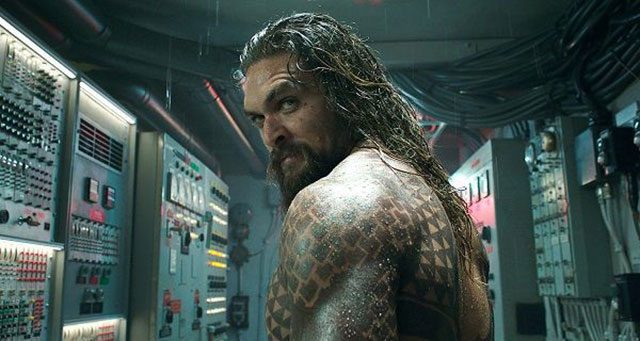
The journey is certainly long as well, so make sure your bladder is prepared! Aquaman spreads itself across a surprisingly massive 143-minute runtime, which has it tied with 2013’s Man of Steel as the second-longest DCEU movie to date, trailing only the 150-plus-minute runtime of 2016’s Batman v Superman: Dawn of Justice as this shared cinematic universe’s current longest offering! This movie could have done with a bit of a trim, especially since it once again falls into that frequent trap that the DCEU too often gets caught in, namely burning through several movies’ worth of material in one single film, rather than allowing the story to fully develop at a reasonable, gratifying pace. Some progression feels drawn-out, while other key character developments feel weirdly glossed over, leaving the storytelling far from airtight in this case. The mind-blowing visuals and superb action certainly make up for the handful of story stumbles however, both of which helping to cement Aquaman as the second-best DCEU movie to date, with only the superb Wonder Woman currently outpacing it.
Jason Momoa’s Arthur Curry/Aquaman has already made a couple of previous appearances in the DCEU, between a quick cameo in Batman v Superman: Dawn of Justice, and a supporting role in Justice League. Aquaman finally gives Momoa’s aspiring King of Atlantis a starring role however, and fortunately, Momoa hasn’t lost a step at all, after his lovable ‘bro-douche’ performance in Justice League. Arthur is still a drunken brute throughout much of Aquaman, having grown surprisingly little since his brief time fighting alongside the DCEU’s other heroes during the events of Justice League, but he is attempting to embrace a more heroic mantle, particularly under the guidance of his human father, Tom Curry, played in a lovable bit part by Temuera Morrison.

Of course, it’s Arthur’s half-Atlantean heritage that ends up becoming the driving conflict in Aquaman, as Arthur’s half-brother, King Orm, played by Watchmen and Insidious alum, Patrick Wilson, conspires to conquer the surface in his bid to unite the undersea kingdoms of Earth under his rule, thus making him the so-called, “Ocean Master.” Ocean Master is Orm’s super-villain identity in DC Comics lore, and it’s worked surprisingly effectively into the story here, even if it feels like most of Orm’s ambitions are predictable and hackneyed. Wilson nonetheless does well in the part of Aquaman’s main antagonist though, delivering a slightly majestic, but woefully self-satisfied Atlantean ruler who believes that the humans have run out of chances to start respecting the ocean and its people. Considering the more deep-running conflicts between Aquaman and Orm in DC Comics lore however, it’s a shame that the would-be Ocean Master feels a little underdeveloped as a villain in this movie.
Surprisingly, it’s Yahya Abdul-Mateen II that ends up being the big standout among the villain cast, portraying Aquaman’s human arch-nemesis, David Kane (this is a change from DC Comics lore, where the character is named David Hyde), a.k.a. Black Manta. Abdul-Mateen II manages to deliver a surprisingly sympathetic and genuinely imposing take on Aquaman’s longest-standing and often most dangerous foe, which is why it’s a shame that he’s frustratingly relegated to being a secondary antagonist in Aquaman, and one that is fully overshadowed by the ambitions of Orm/Ocean Master. I do somewhat wish that the movie hadn’t prematurely blown its wad on Black Manta in this case, and had perhaps left Kane’s proper transformation into Black Manta for an inevitable sequel. Still, at least Abdul-Mateen II helps Aquaman ironically avoid a throwaway ‘Marvel villain’ problem, which the DCEU movies seemed to be developing themselves in the wake of Wonder Woman and Justice League last year.
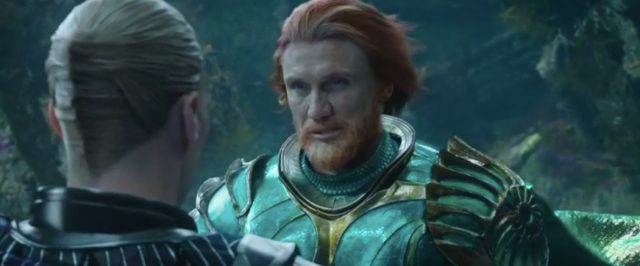
Once again though, most of the focus is wisely placed primarily on the titular hero in Aquaman, even if Amber Heard’s Mera stands as an equally impressive lead heroine, one who practically deserves to be billed in the title herself! Mera, the current Princess of Atlantis, and daughter to Dolph Lundgren’s Xebel Tribe king, Nereus, an ally to Orm’s forces, takes it upon herself to try and guide Arthur to Atlantis, after briefly interacting with him during the events of Justice League last year. Heard’s Mera is adventurous, brave and cunning, and even possesses amazing aquakinetic abilities that manage to easily rival those of Aquaman himself, making her just as badass and impressive during Aquaman’s action scenes. Jason Momoa and Amber Heard also display some pretty exceptional chemistry to boot, making their tense, but reliable rapport a constant delight to watch, even as the budding romance between these two characters feels exceedingly obvious right from the get-go.
There are a few other noteworthy supporting actors as well, most notably Nicole Kidman as Arthur’s Atlantean mother, Queen Atlanna, with Kidman making a long overdue return to DC movies after her role as Dr. Chase Meridian in 1995’s Batman Forever. Kidman only has a few scenes, but she manages to portray an impressive warrior queen during her handful of moments, one that also carries just enough drama and humour to flesh out the rest of Arthur’s personality, and where some key parts of it may have come from. Any remaining part of this is nicely filled in by Willem Dafoe’s Nuidis Vulko, the trainer and proper mentor to Arthur’s Atlantean identity, in lieu of the missing Atlanna. Dafoe is of course best known for playing Spider-Man movie villain, Norman Osborn/Green Goblin for the Marvel movie catalogue, so it’s interesting to see him as a more heroic character in the DCEU, one that is difficult to delve much into without spoilers, but one that manages to provide another clever and resourceful secondary father figure for Arthur, giving him a believable means to prepare for the extraordinary battle ahead.
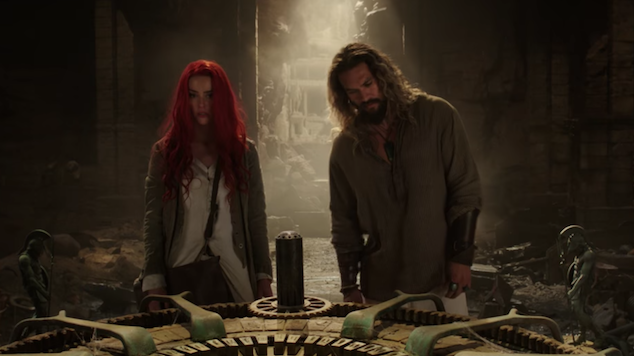
It feels like there are many, many characters in Aquaman, though only a handful of them end up truly being that consequential to the storyline, namely the ones I already mentioned. Even then, the heroes most definitely end up more impressive and better developed than the villains here. The baddies’ motivations could have used a bit more subversion and depth in Aquaman, save for the frustratingly under-utilized Black Manta, who, like I said, was probably best off saved for a sequel. If you’re not a DC fan, you may be a bit overwhelmed by the sheer amount of tribes and lore and other such factions that Aquaman sometimes expects you to keep track of across its rather extensive runtime, but fortunately, the villains’ plans are at least not terribly complicated, and nor is the key way of stopping them. Aquaman’s minor character roster is a little overstuffed at times, one of several factors contributing to the slightly overlong runtime, but at least the key personalities are mostly given the proper amount of focus, even if lead villain, Orm could have fostered a deeper agenda than the simple desire to be a dick to Arthur and the surface.
Aquaman’s storyline is straightforward on paper, but it’s frequently bogged down with world-building details. To an extent, this is good, since it lends a lot of depth and richness to the world of Atlantis, which is already ripe for further exploring across several sequels. On the other hand however, the presentation of Atlantis may feel a little bit overwhelming if you’re not already an established superhero enthusiast. There’s clearly a large part of the storyline in Aquaman that’s simply dedicated to laying the groundwork for the inevitable follow-ups that Warner Bros. will eventually produce, which can sometimes take focus away from the task at hand. It’s all entertaining, but the pacing and focus could have sometimes used some tightening.
Like I said, the DCEU has often had this problem in general; Overstuffing its movies with extraneous story material that really should have been withheld for sequels, or left on the cutting room floor. Aquaman’s sheer scope is undeniably impressive, but the movie wouldn’t have suffered much, if at all, if we weren’t introduced to some of these story elements right away. The especially massive nature of the full-blown war that erupts by the climax in particular feels like a bit of an issue, since it’s a big development that’s being rushed out at the end of the very first movie, in turn leaving the sequels with the difficult task of somehow topping a grand battle that seemingly incorporates the entire ocean’s most dangerous forces! Making matters worse here is that not every heroic moment with Arthur feels fully earned beforehand, since the story sometimes has to shove him and his motivations along, even when he really could have used a bit more emotional adversity, especially when you consider that he’s supposed to be the DCEU’s ‘bad boy’ hero, as first established in Justice League last year.
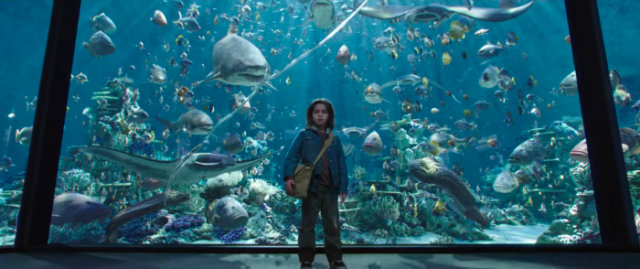
Despite some of the over-stuffed and glossed-over story elements however, Aquaman doesn’t often draw too much attention to its clearly bloated final product. Whenever the movie is in danger of dragging or becoming dull, it does inject a welcome dose of humour or action to keep the audience’s interest going strong. Director, James Wan seems to particularly love abruptly interrupting several dialogue scenes with sudden action sequences as well, to the point where this trick is so blatant and repeated that you could make a pretty humourous drinking game out of it! Aquaman is quite long, and its otherwise straightforward storyline sometimes feels overdone and overthought, but the movie at least keeps the entertainment value quite high, even for non-superhero fans, particularly when even its most drawn-out and slow scenes are at least a joy to look at, thanks to the sublime visual presentation!
(NOTE: The spoiler section, when clicked, discusses potential setups for future Aquaman sequels, post-credits scenes, and any potential connections to the DC Extended Universe at large.)
Aquaman also possesses one mid-credits scene, but no post-credits scene. The mid-credits scene involves a surprise character, Randall Park’s Dr. Stephen Shin, a newer supporting personality of Aquaman’s from DC Comics lore, who was completely kept out of Aquaman’s marketing. Shin makes one brief appearance on a TV broadcast during the movie proper, trying to claim that he knows Atlantis is real, only to be scoffed at by other members of the media, despite Aquaman’s heroic acts being fully in the DCEU’s public eye and media cycle, right from the start of the movie. This eventually leads into a mid-credits sequence that sets up an Aquaman movie sequel, wherein Black Manta is rescued from a piece of driftwood by a fishing boat, after Arthur and Mera successfully defeat him, and send him tumbling off a cliff to an uncertain fate in Sicily. Shin takes it upon himself to nurse Black Manta back to health, while also repairing and upgrading the technology behind Black Manta’s new Atlantean super-suit. When Black Manta regains consciousness, he proposes an alliance with Shin, wherein he will help get Shin to Atlantis, if Shin can give Black Manta the means to kill Aquaman. This will likely serve as a key foundation for an Aquaman sequel’s storyline, even though an Aquaman sequel has yet to be officially announced by Warner Bros. or DC.
Aquaman director, James Wan may be most associated with horror movies, having broken out with the likes of Saw, Insidious and The Conjuring, but he did exceptionally prove his blockbuster potential with 2015’s surprisingly great Furious 7 as well. Wan once again brings a superb sense of blockbuster spectacle to Aquaman, which is a very clear passion project for him. His ambitions for an Aquaman movie clearly span quite a lot of imagination and scope, as Wan frames every scene with a grand, sweeping sense of scale. It’s certainly a noble endeavour to strive this hard to make an Aquaman movie feel so genuinely epic, but that’s astonishingly what Wan manages to pull off, creating a production that manages to outclass the cinematic offerings of Superman, Wonder Woman and even the entire Justice League on a sheer production scale!
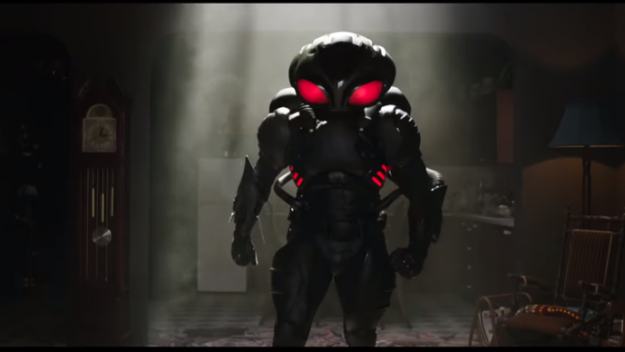
Wan’s direction is at its most impressive during the action scenes as well, most of which unfold from an underwater perspective. There are at least two major surface action scenes however, both of which being extensively publicized in the trailers, with one being a great hand-to-hand fight with Nicole Kidman’s Queen Atlanna, and the other being the Black Manta attack in Sicily. These scenes are tightly-choreographed, fast-moving and full of impressive destruction, proving that Wan’s magic touch is just as potent on land as it is under the sea in Aquaman! There’s no denying that Wan’s action-packed direction shines most during the especially impressive underwater sequences though, which just keep growing in terms of their scope and stakes as the movie progresses. By the climax, Wan has fully embraced the entire might of the Seven Seas, delivering a chaotic, enormous war for the very fate of the ocean and the surface, which is consistently a mind-blowing spectacle to behold!
The only place where Wan’s direction can sometimes be a little more uneven is during some of the quieter scenes. Some of these emotional moments are captured well, especially when Wan remains committed to Aquaman’s epic scope and framing. At other times though, the performances and direction don’t fully manage to come together, which is why we sometimes get the feeling that key character moments are being glossed over, in favour of more visual flourishes and excitement. Wan does seem to have a pretty solid eye for comedic timing though, giving Aquaman quite a lot of funny moments, which effectively satirize and celebrate the sillier elements of Aquaman’s comic book history, as well as the potential behind the DCEU’s more rough and raw take on the character. Of course it also helps that Wan seems to work very well with Jason Momoa and Amber Heard, making their on-screen chemistry shine all the more, and elevating both the drama and the comedy for Arthur and Mera in equal measure.
Rupert Gregson-Williams composes the score to Aquaman, which manages to be another highly impressive DCEU soundtrack. There’s an interesting combination of majestic serenity, grand orchestra and more intense rock throughout the music suite, which nicely manages to balance a movie that simultaneously feels like an exotic adventure and a kick-ass superhero blockbuster. The softer compositions are also quite superb, helping to pick up the slack for some of the less effective emotional scenes, and accentuating the drama on all of the right notes, pun not intended. The DCEU has had no shortage of strong musical selections so far, and Aquaman does that reputation proud, managing to add some solid gravitas and credibility to the proper cinematic origin of one of DC’s most contested superheroes.
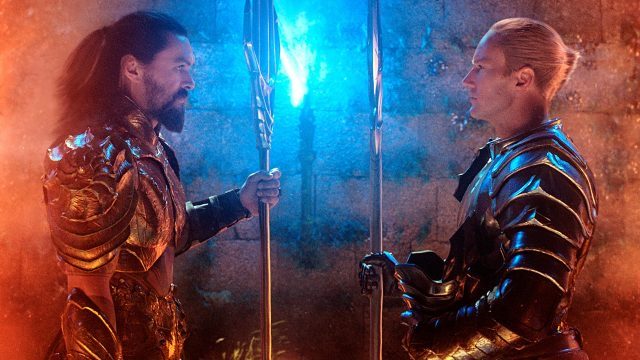
The rest of the sound design is equally impressive, particularly when it has to blend with the frequent underwater environments. There’s almost an alien quality to the invading Atlanteans, even on the surface, as otherwise mighty and earth-rending action scenes end up playing with the waterborne enemies that are in constant pursuit of the titular hero. Some of the pure destruction is better realized with the fully human Black Manta and his own deadly arsenal, but the audio is at its most novel and engaging when Arthur and Mera are participating in the many underwater action scenes. This can be a tricky balance, since setting so much of Aquaman underwater inevitably means that the sound design will require a lot of tinkering, in order to prevent the feeling of being dampened by the waterlogged battlefields. Fortunately, Aquaman somehow manages to deliver a lot of its most impressive audio engineering during the underwater sequences, which lend an incredible ferocity to Atlantis and its forces that audiences wouldn’t initially expect, single-handedly obliterating any corny memories of Aquaman’s less imposing comic book beginnings!
It simply cannot be overstated just how much of a visual masterpiece Aquaman truly is! For all of its flaws, the DCEU has certainly never struggled in the visual department, with even the most flawed of its current movie offerings still being gorgeous, eye-catching works throughout. Aquaman however is in a whole new class of style, with its hugely ambitious underwater presentation creating one of the most enthralling and memorable cinematic worlds that one can enjoy on the big screen in 2018! The world of Atlantis leaps to life with incredible vibrancy, colour and light here, while the surface scenes also shine with a sense of exotic beauty and splendour. It still slightly feels like the DCEU is over-correcting from the darker presentation of its earliest movies in Aquaman, but it’s impossible to complain when everything looks this gorgeous, from the environments to the character designs to the special effects. You just have to see this to believe it, folks!
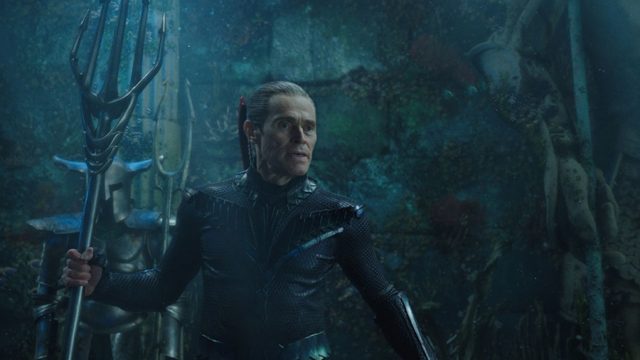
Aquaman definitely demands to be seen with as many visual enhancements as you can get to boot. I was fortunate enough to attend an early screening in IMAX 3D, and that really is the ideal way to experience Aquaman, namely at its biggest and most immersive. Even when watched flat in 2D, the IMAX presentation does quite a lot to help the sprawling undersea environments feel bigger and more engrossing, easily bringing audiences into the rich underwater realm of the DCEU. The 3D presentation further enhances this outstanding immersion, adding an incredible degree of potent depth to even the surface environments, let alone the underwater ones, while also enhancing the action scenes with exploding debris and bursts of liquid that pull audiences into the thrills with exceptional aplomb! It’s very difficult to adequately put the details into words, especially without spoiling some cool surprises, but I can say without exaggeration that Aquaman is not only the best-looking DCEU movie to date, but also perhaps 2018’s most impressive live-action visual showcase at the movies! Trust me when I say that the extra bells and whistles in your preferred premium theatrical format are worth every extra penny!
It’s tough to reasonably knock Aquaman for being over-ambitious, especially when it has the tricky task of trying to compel audiences to take its titular hero seriously, after so many decades of mockery. If nothing else, Aquaman goes for broke with its ambitions, from a world-building standpoint, from a soundtrack standpoint, from a visual standpoint, and especially with a proud, full-bore desire to embrace even the most over-the-top elements of Aquaman’s adventures in DC Comics lore. Even with some of its storytelling failings, Aquaman is nonetheless one of the most impressive movies of 2018, if for no other reason than how much it shines as an ambitious technical showcase. Hell, the very fact that it seems to single-handedly solidify the cinematic potential of Aquaman, after so much time as an oft-derided DC superhero in other media, is reason enough to celebrate Aquaman as a clear success for the DC Extended Universe, one that does manage to lend itself to a fairly promising new superhero movie franchise!
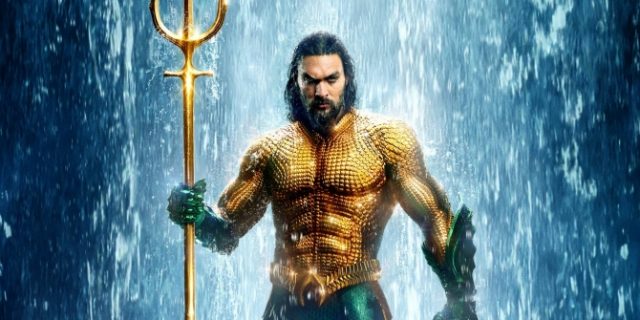
In the end, Aquaman still doesn’t quite manage to keep pace with the bulk of Marvel Studios’ superior offerings from a narrative standpoint, though it is nonetheless an improvement over the DCEU’s previous Justice League. Wonder Woman remains the crown jewel in the DCEU movie catalogue at this point, but Aquaman still represents some key steps forward for the DCEU at large, granting it another franchise-headlining superhero that it can be proud of, and one that should hopefully have some more promising cinematic adventures ahead, whether he’s headlining them solo, or working with the rest of DC’s finest do-gooders. The storyline may have a few issues, primarily when it fails to make the most of its villains (particularly the otherwise great Black Manta), but Aquaman still stands as a wonderful testament to the potential creativity and epic scope that the DCEU can achieve under the right leadership, especially when it stops trying to simply copy Marvel Studios’ homework!

